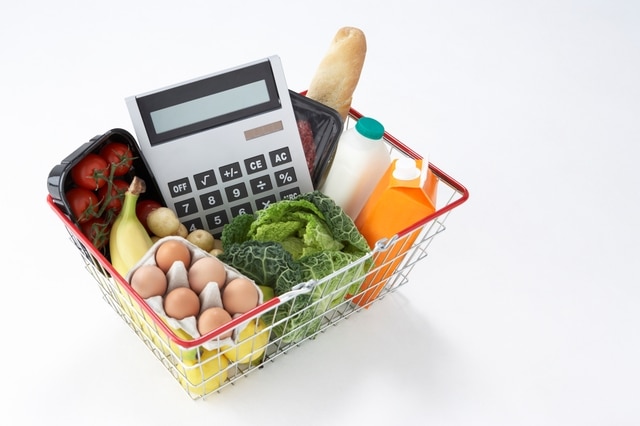10 Money-Saving Tips for Grocery Shopping on a Budget
- Make a shopping list before you go to the store and stick to it. This will help you avoid impulse purchases and save money.
- Look for sales and discounts on items you regularly buy. Stock up on these items when they are on sale to save money in the long run.
- Use coupons and digital discounts to save even more on your grocery bill. Many stores offer digital coupons that can be loaded onto your loyalty card for extra savings.
- Buy store brands instead of name brands. Store brands are often cheaper and of similar quality to name brands.
- Buy in bulk when possible. Items like rice, pasta, and canned goods can often be purchased in larger quantities for a lower price per unit.
- Plan your meals for the week based on what’s on sale at the store. This will help you save money and reduce food waste.
- Avoid shopping when you’re hungry, as this can lead to impulse purchases of unhealthy and expensive items.
- Compare prices at different stores to find the best deals. Consider shopping at discount grocery stores or buying in bulk at warehouse clubs for additional savings.
- Use loyalty programs and rewards cards to earn discounts and cash back on your purchases.
- Consider shopping online for groceries, as this can help you compare prices and find deals more easily. Many online retailers also offer discounts and promotions for first-time customers.
Frugal Living: How to Cut Your Grocery Bill in Half
Grocery bills can quickly add up and become a significant portion of your monthly expenses. However, with some careful planning and strategic shopping, you can cut your grocery bill in half and save money. Here are some tips for adopting a frugal approach to grocery shopping:
- Make a meal plan: Before heading to the grocery store, take some time to plan out your meals for the week. This will help you avoid impulse buys and ensure that you only purchase what you need.
- Shop with a list: Once you have your meal plan in place, create a shopping list based on the ingredients you will need. Stick to your list while at the store to avoid unnecessary purchases.
- Use coupons and discounts: Look for coupons and discounts on the items you regularly buy. Many grocery stores offer weekly sales and promotions that can help you save money.
- Buy in bulk: Consider purchasing items in bulk, especially non-perishable items like rice, pasta, and canned goods. Buying in bulk is often more cost-effective in the long run.
- Compare prices: Be sure to compare prices between different brands and store options. You may find that certain items are cheaper at one store compared to another.
- Cook at home: Eating out can quickly add up and be much more expensive than cooking at home. Make an effort to prepare meals at home as much as possible to save money.
- Grow your own produce: If you have the space and resources, consider growing your own fruits and vegetables. This can save you money on produce and provide you with fresh, organic options.By implementing these frugal living tips, you can cut your grocery bill in half and save money each month. With some planning and smart shopping, you can enjoy delicious meals while staying within your budget.
Smart Strategies for Saving Money on Groceries Every Week
Grocery shopping is a necessary expense, but there are ways to save money without sacrificing quality or variety in your meals. By implementing smart strategies and being mindful of your spending habits, you can reduce your grocery bill every week. Here are some tips to help you save money on groceries:
- Plan your meals and make a shopping list: Before heading to the store, take some time to plan out your meals for the week. This will help you avoid unnecessary purchases and ensure that you only buy what you need. Make a detailed shopping list based on your meal plan and stick to it while at the store.
- Shop with a budget in mind: Set a weekly grocery budget and try to stick to it as closely as possible. Use cash or a debit card instead of a credit card to avoid overspending. Keeping track of your expenses can help you stay within your budget and save money in the long run.
- Look for sales and discounts: Keep an eye out for sales, promotions, and discounts on groceries. Check local store flyers, websites, and apps for deals on items you regularly buy. Buying in bulk or taking advantage of buy-one-get-one-free offers can also help you save money.
- Use coupons and loyalty programs: Clip coupons from newspapers, magazines, or online sources to save money on groceries. Many stores also offer loyalty programs that provide discounts, rewards, or cash back on your purchases. Take advantage of these programs to maximize your savings.
- Buy generic or store brands: Consider purchasing generic or store-brand products instead of name brands. These items are often cheaper and can be just as good in quality as their more expensive counterparts. Compare prices and try out different brands to see which ones work best for you.
- Avoid impulse purchases: Be mindful of impulse buys while shopping. Stick to your shopping list and avoid unnecessary items that can add up quickly. If you see something you want but don’t need, give yourself some time to think about whether it’s worth the extra cost.
- Shop strategically: Pay attention to the layout of the store and the placement of products. Stores often place higher-priced items at eye level or near the checkout to tempt customers. Take the time to compare prices and consider buying cheaper alternatives or store specials.By following these smart strategies for saving money on groceries every week, you can reduce your food costs and make the most of your shopping trips. With a little planning and mindfulness, you can enjoy delicious meals while keeping your budget in check.
Budget-Friendly Meal Planning: Tips for Stretching Your Grocery Budget
Meal planning is an essential strategy for saving money on groceries while still enjoying nutritious and delicious meals. By carefully planning your meals for the week ahead, you can avoid unnecessary trips to the store and make the most of the ingredients you already have on hand. Here are some tips for stretching your grocery budget through budget-friendly meal planning:
- Start by taking inventory of your pantry, fridge, and freezer. This will help you identify what ingredients you already have and prevent you from buying duplicates. Use these ingredients as a base for your meal planning and build your grocery list around them.
- Plan your meals around seasonal produce and sales. Seasonal fruits and vegetables are often more affordable and tastier than out-of-season produce. Additionally, keep an eye out for sales and discounts on staple pantry items like beans, rice, and pasta.
- Opt for simple and versatile recipes that use common ingredients. This will not only save you money on groceries but also reduce food waste by using up leftover ingredients in multiple meals. Look for recipes that can be easily customized based on what you have on hand.
- Consider batch cooking and meal prep to save time and money. Prepare large batches of meals and portion them out for easy grab-and-go lunches or dinners throughout the week. This can also help you avoid the temptation of ordering takeout on busy nights.
- Shop with a grocery list and stick to it. Avoid impulse purchases by planning your meals ahead of time and only buying what you need for the week. This will help you stay on budget and prevent food waste.
- Use coupons, discount codes, and cashback apps to save money on groceries. Look for deals and promotions at your local grocery store or online retailers to maximize your savings.By following these tips for budget-friendly meal planning, you can stretch your grocery budget and enjoy delicious meals without breaking the bank. With a little bit of planning and creativity, you can eat well on a budget and still enjoy a variety of nutritious and satisfying meals.
Frugal Living Hacks: Easy Ways to Save Money on Groceries
In today’s economic climate, many people are looking for ways to stretch their dollar further. One area where you can easily save money is on your grocery bill. By implementing some frugal living hacks, you can cut down on your grocery expenses without sacrificing the quality of your meals. Here are some easy ways to save money on groceries:
- Plan your meals: Before heading to the grocery store, take the time to plan out your meals for the week. This will help you create a shopping list and avoid impulse purchases. Try to use ingredients that you already have on hand to reduce waste and save money.
- Buy in bulk: Purchasing items in bulk can often be more cost-effective than buying smaller quantities. Look for deals on staples like rice, beans, and pasta, and consider buying in larger quantities to save money in the long run.
- Use coupons and discounts: Keep an eye out for coupons and discounts on items you regularly buy. Many grocery stores offer digital coupons that you can easily clip and use at checkout. You can also sign up for rewards programs to earn discounts on future purchases.
- Shop sales and clearance items: Take advantage of sales and clearance items to save money on groceries. Look for discounted produce, meat, and dairy products that you can use in your meals. Just make sure to check expiration dates and use items before they go bad.
- Cook at home: Eating out can quickly add up, so try to cook at home as much as possible. Not only is cooking at home typically cheaper, but it also allows you to control the ingredients and portion sizes of your meals.By implementing these frugal living hacks, you can easily save money on groceries and reduce your overall expenses. With a little planning and effort, you can enjoy delicious meals while staying within your budget.



